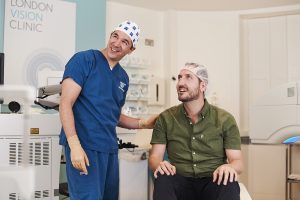Wake Up Sharp – Not Blurry – with Laser Eye Surgery

All of us, at one time or another, have woken up with a foggy head and hazy vision – sometimes accompanied by a whisper of a headache. Having fumbled around on the bedside table for your glass of water or stumbled, arms stretched out in front of you, to the bathroom, you might not even be able to see yourself properly in the mirror.
But while for some, this may simply be the temporary side effects of a heavy night on the town or perhaps the prelude to a cold or flu, for those of us who have to rely on contact lenses or glasses, this is simply another blurry morning.
Your day may well start with a hunt around the house for your glasses. How strange. You could have sworn you left them on the bedside table. Are they in the bathroom? Nope. The living room? Apparently not. Better check the bedside table again… There they are!
Having finally located your glasses or successfully guided your contact lenses into your eyes, your day can begin. The haze may be temporarily lifted and you can start to get on with the tasks you’ve set yourself. But it’s likely that poor vision will still have a part in shaping your day.
Is Poor Vision Affecting Your Day?
It’s no secret that the tiniest inconvenience can sometimes be enough to change the trajectory of your whole day. It can affect our mood and, in turn, how we interact with others and our motivation and enthusiasm to complete our daily tasks. And when it comes to wearing glasses and contact lenses, those tiny inconveniences are plentiful.
Even if you easily shake off the daily glasses hunt or fiddly contact lens application, there’s still plenty more to come. Lost your glasses again? Are they on your head? Oh, yes – there they are. Don’t forget to take them off before opening the oven… Great, they’ve steamed up. Remember to take your contacts out before bed -you don’t want to risk an infection!
It’s a wonder you manage to get anything done!
Perhaps you’ve made the switch between glasses and contact lenses to compare their downsides. Chances are you can find just as many things to complain about with either solution. Surely there’s a better option.
Imagine waking up in the morning and simply rolling out of bed with crisp, clear vision from the outset. You might be amazed to discover how much time you’ve wasted looking for your glasses or trying to locate that dropped contact lens. Well, you may not have to imagine – that is if you opt for the third option: Laser Eye Surgery.
Why You Should Consider Laser Eye Surgery
It can take most people a long time to start considering Laser Eye Surgery as a serious option. This is understandable given the associated costs and the presumed upheaval that goes with the procedure. But these perceived downsides might not be as significant as you might imagine.
In fact, when you compare the cost of Laser Eye Surgery with the costs associated with glasses and contact lenses, you might be surprised to learn just how affordable the procedure can be (especially with our finance options). And did we mention that most patients are able to return to work just 24 hours after their treatment? Doesn’t sound that inconvenient, right?
But by far the biggest selling point of Laser Eye Surgery is its potential to rid you of all the inconveniences of glasses and contact lenses. And thanks to recent advancements in the field, more people are suitable for treatment than ever before.
So, if you wake up one day and grow tired of your blurry vision, the daily glasses hunt or the infuriating contact lens routine, it might be time to finally consider the third option. Once you make the decision, you could be waking up sharp before you know it.
Don’t let your day be shaped by poor vision. Get in touch with one of our friendly clinic coordinators to find out how you could like glasses- and contacts-free. Alternatively, Book a Consultation today to start your journey to clear vision.


